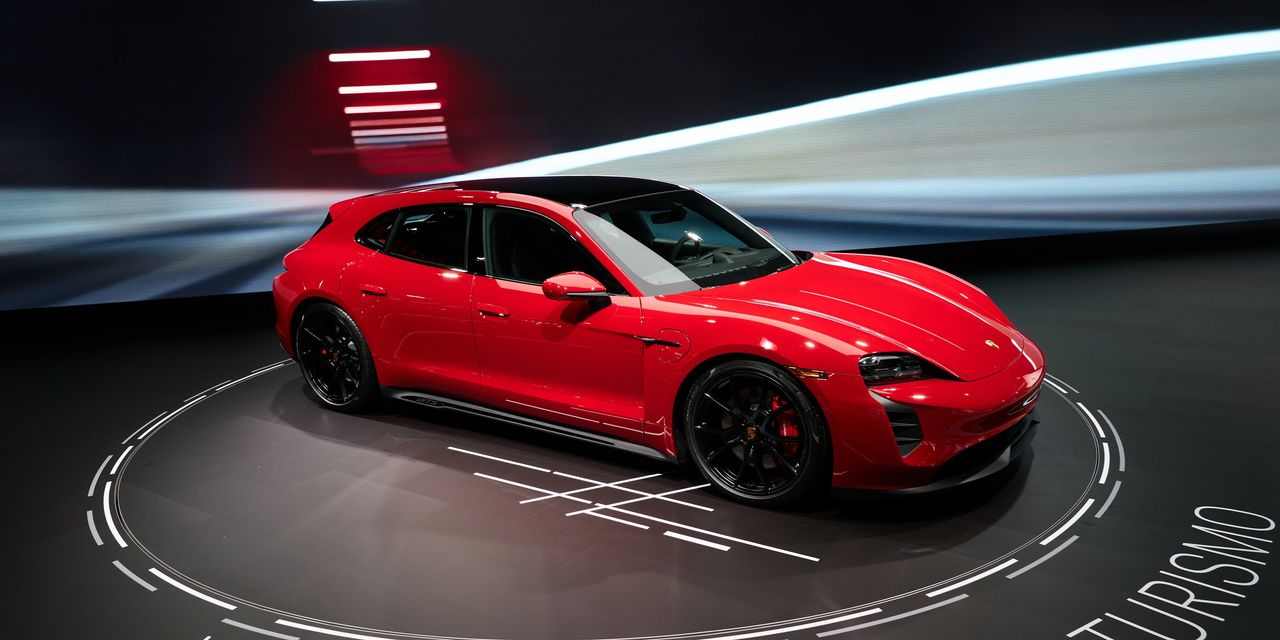
For a few traditional auto makers, splitting out hot assets could be a neat way to compete for capital with the likes of Tesla and Rivian. For most, though, it is more complicated than that.
Wall Street never tires of wondering what companies such as Volkswagen VOW 2.09% or General Motors might be worth if their subsidiaries were valued more in line with listed peers. Hopes this month have centered on VW, following reports by Reuters and German newspaper Handelsblatt that the manufacturer continues to evaluate an initial public offering of its lucrative sports car brand Porsche.
As brokerage Bernstein pointed out, if Porsche’s profits were given the same multiple as those of independently listed Ferrari, the unit would be worth far more than its parent. Porsche also has a promising toehold in electric vehicles: The all-electric Porsche Taycan outsold the brand’s classic petrol-powered 911 model in the first nine months of the year. VW shares jumped around 9% on the day of the IPO reports.
News around GM is flowing in the opposite direction. Expectations that it will list its majority-owned autonomous-vehicle unit Cruise took a hit last week when GM announced the departure of the unit’s chief executive, Dan Ammann. GM didn’t give an explanation, but Mr. Ammann, a former banker, was associated with the push for an IPO of Cruise, which counts Honda and SoftBank among its minority investors. GM shares fell roughly 6% in response.
The two cases illustrate the conundrum: Car makers want to tap bullish auto-tech and luxury investors, but without ceding control over assets central to their future.
Even after a strong post-pandemic recovery, shares such as GM and VW are very lowly rated relative to EV specialists, which offer investors huge growth potential, as well as to luxury doyen Ferrari. That means Tesla and EV startups can turn to stock investors for the vast sums required to design and build the next generation of cars, while traditional players have to rely on hard-earned cash flows. The latter need ways to level the financial playing field.
Porsche isn’t the only asset VW could raise funds against. Perhaps with an eye to the blockbuster IPO of South Korean battery giant LG Energy, VW last week announced the creation of a dedicated company for its battery investments. Similarly, analysts speculated earlier this year that GM could carve out its battery platform, Ultium, as it did Cruise.
The problem with such theories is that EVs and associated digital technology lie at the heart of auto makers’ strategies. Companies might consider selling stakes in supply-chain assets—that is VW’s plan with the battery business—but only when the deals don’t limit their strategic flexibility. GM’s reluctance to list Cruise is a hint that CEO Mary Barra increasingly sees driver automation as a core company competence like EVs, not a side business best suited to taxis.
The few EV spinouts that have been announced are exceptions that prove the rule. Last week, Harley-Davidson said it would take its LiveWire EV brand public via a merger with a special-purpose acquisition company. Ironically, though, a key part of the pitch is that Harley bikes, unlike cars and LiveWire’s urban two-wheelers, aren’t ready to go electric: Batteries are still too heavy to take bikes long distances. Without equivalents of Tesla or Rivian encroaching on Harley’s home turf, it can consider EV technology enough of a sideline, for now, to sell a minority stake at a punchy valuation.
Porsche is a similarly plausible spinoff candidate because VW’s wider EV push doesn’t depend on it. Also, the parent company’s controlling shareholders, the descendants of Ferdinand Porsche, would likely love to have their forefather’s namesake brand independently listed again. The potential deal has emotional as well as strategic momentum.
The most shareholder-friendly model for a listing would be Mercedes-Benz owner Daimler’s recent spinout of its heavy-truck division directly to investors, which would give Porsche a proper free float and independence. But the latest press reports suggest VW is instead considering a minority IPO, which would raise funds for the parent but might not unlock much value. Minority-listed stocks often trade at discounts due to illiquidity and controlling shareholders who don’t always have the same interests as capital markets. This is a problem for Harley investors to watch, too: The bike maker will still own almost three-quarters of LiveWire after its SPAC merger.
Auto makers considering spinouts are left with a dilemma. They can retain control of assets, but doing so would be partly self-defeating because it would limit the value that can be wrung out of them.
Investors may need to think more about how car manufacturers can improve their valuations by spinning off legacy combustion-engine assets—a subject only Volvo Cars has meaningfully broached. Financial engineering probably can help the automotive industry, but not in the way Tesla-obsessed investors often think.
Write to Stephen Wilmot at [email protected]
Copyright ©2021 Dow Jones & Company, Inc. All Rights Reserved. 87990cbe856818d5eddac44c7b1cdeb8







